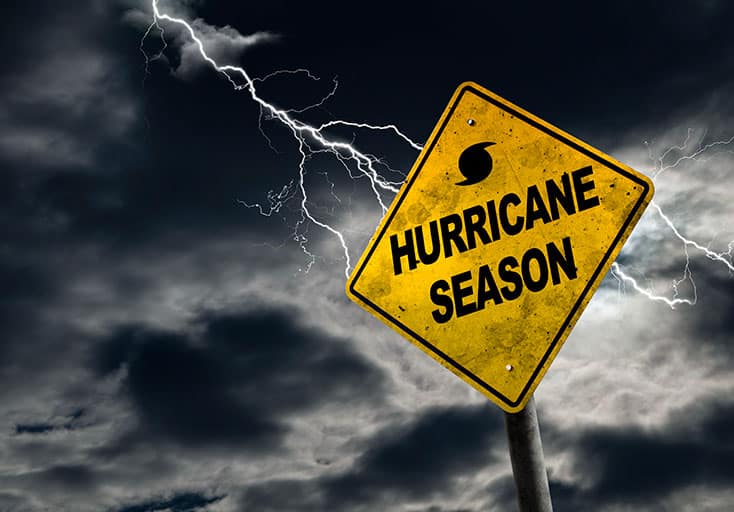How to Prepare a Yacht for a Hurricane
Planning, preparation, and timely action are the keys to protecting your boat during a hurricane and overall severe storms. A cyclone may make you feel uneasy. However, it is crucial to stay calm and take action to ensure you and your vessel are safe.
Depending on the boat owner’s vessel, boating environment, and weather conditions, it is vital to have a strategic plan that suits the situation.
Below are some essential steps you should avoid skipping and tips you should familiarize yourself with.

When is Hurricane Season in Miami?
Hurricane season in Miami starts from June 1st and lasts until November 31st. Commonly, Miami experiences the most landfall during mid-August and late September.
Preparing Your Boat Ahead of the Storm
After planning the well-being of you and your family, the next highest priority before a hurricane for a boat owner should be his vessel. Understanding all the possibilities that can be done to keep your vessel safe is essential. If you are unable to move your vessel to a safe, indoor location, you must protect and prepare it to be able to endure the upcoming tropical storm on the outside.

Trailerable
If your boat is trailerable, you must have a towing vehicle that is low enough to move your boat. Inspect the trailer to ensure the tires bearings, axle, and overall trailer are in good condition to make the transfer.
After you have inspected and confirmed the boat is ready to be moved, it is time to haul your vessel out of the water; you then need to find a safe location far away from the tidal waters.
Once you have located a safe place away from trees and tidal waves, lash your boat and trailer. Make sure to place blocks between the frame members and axles inside each wheel to avoid movement. When searching for a location, attempt to locate a spot that permits you to secure the vessel with heavy nylon lines from all sides. Do not secure your boat to a tree. Remember to remove drain plugs and all electronics on board.
Non-trailerable boats, if in dry storage, should never be left on davits or a hydro-lift. If you choose to store your boat in wet storage, make sure to secure the boat in the marina berth, moor the boat in a safe area, haul the vessel and leave the site well in advance.
You must have all batteries charged and inspected to ensure their full capability to run automatic bilge pumps for the storm’s duration. It would be wise to pack backup batteries. Remember to shut off all devices that consume electricity.

Marina
If you cannot haul your boat from the water and your vessel must stay at the marina, it is important to do the following; double all lines, rig-cross spring lines fore and aft, and attach lines high on pilings allowing tidal rises or surges. You should secure your vessel on the offshore side to solid pilings making sure that the cleat and other attachment points are vital. Make sure you choose the strongest, strongest pilings appropriately installed to ensure the lines will not slip off. Remember, the longer the dock lines, the safer your boat will be during the high tides.
Installing fenders to your boat protects it from rubbing against the pier, pilings, and boats secured near you. Wrapping all lines where lines feed through chocks with tape, rubber hoses, and tape or leather prevents chaffing.

Mooring
If your vessel will remain on a mooring, you need to verify that the mooring is designed to withstand your boat. By contacting your marina or the provider of the mooring, you can clarify the maximum load. Ensure the chains and swivels are connected to the mooring buoy. It is essential to double up on the mooring pendant.
Do Not Stay Onboard
Hurricanes can exceed over 100 mph winds. If you are on board during a tropical storm, you are risking your life and those with you, if that be anyone. Not waiting until the last second to prepare yourself for the storm is imperative to you. Taking precautions before your trips are essential to keeping yourself and those around you safe. Once again, do not stay on board during a severe storm or hurricane.
Here are some more tips that are important to follow before a tropical storm:
- You must frequently check the weather broadcast before, during, and after you operate your vessel. Making it a habit to monitor the weather will help you overall.
- Keeping all belongings marked and documented is essential for easy documentation if lost in a storm. Make sure to label paddle boards, kayaks, and life jackets with your contact information. It is also essential to remove all moveable equipment before the storm, such as; canvases, sails, radios, Biminis, furling roller sails, etc.
- Make sure to keep all your records and documents in a safe place; this includes insurance policies, photos of the vessel, boat registration, equipment inventory, and lease agreements with the marina and storage facility.
- It is essential to keep a list of your contacts, such as the marina, emergency tower providers, and your insurance agent, as well as a list of emergency contacts.
Once The Storm Has Passed
Scan your vessel for leakage from natural gas and propane. You can do this by smelling the air, do not use matches or candles. Verify that dock lines and mooring pendants are secured and confirm there are no submerged objects or debris in the way of your path. It is essential that you contact local authorities to make sure the waterways are safe to navigate through.
Florida Yachts International is standing by and ready to answer any additional questions you may have about preparing your boat before a storm, or any other boating or yachting questions you may have. We offer a worldwide inventory of new and used boats for sale in Miami. Our expert team of yacht consultants have more than 300+ years of combine experience at buying and selling boats of all sizes. Call us today at 305-239-4978 or simply contact us online.

